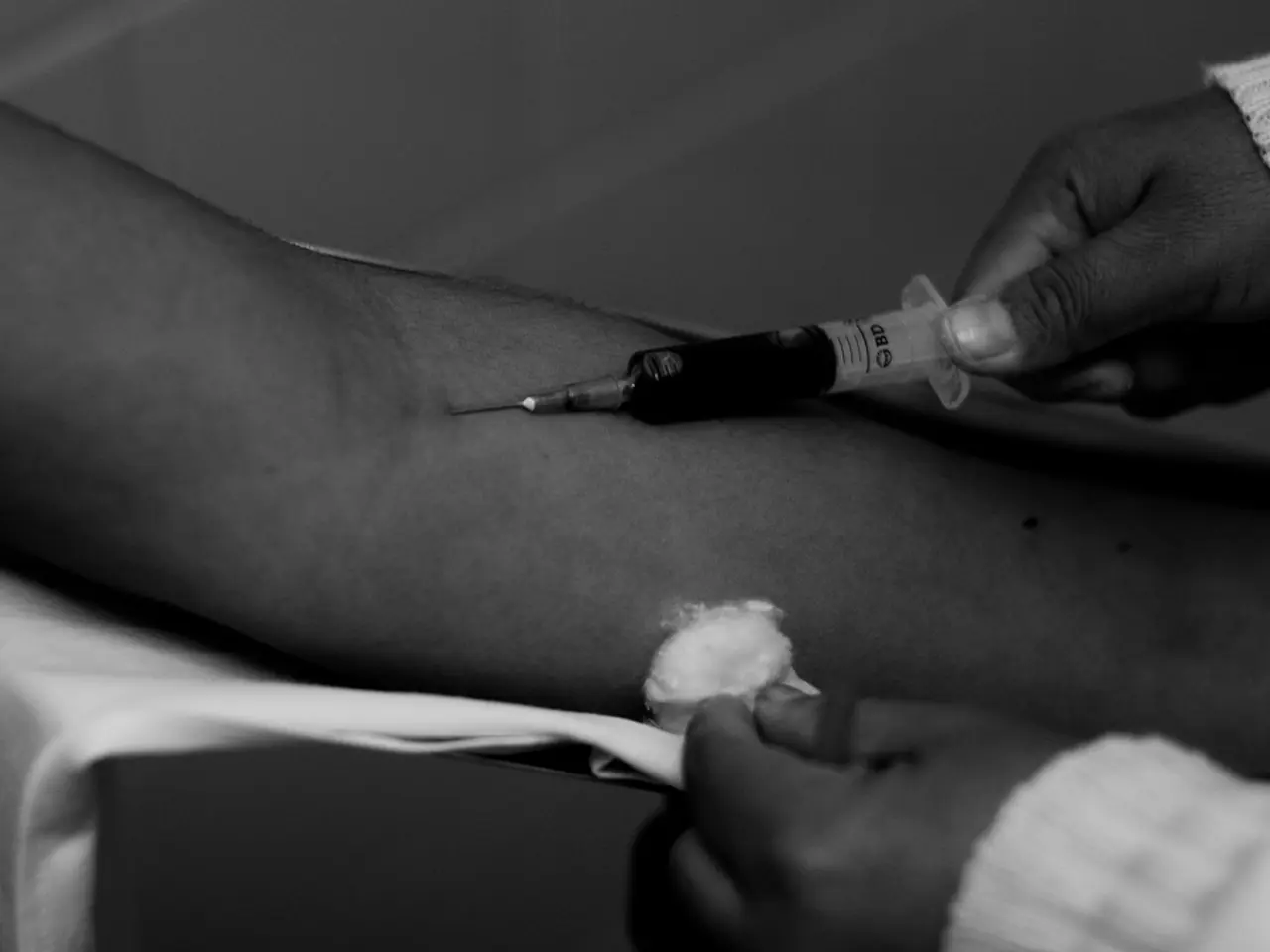Fear of needles explained: Symptoms, root causes, and additional information
Managing Trypanophobia: Overcoming the Fear of Needles
Trypanophobia, a fear of injections, is a common phobia that affects a significant number of people. According to the Centers for Disease Control and Prevention (CDC), as many as one in four adults may delay getting the COVID-19 vaccine due to trypanophobia.
This phobia is more than just an aversion to needles. The International Classification of Diseases (ICD) and Diagnostic and Statistical Manual of Mental Disorders (DSM) criteria for needle phobia state that the fear causes significant distress and avoidance, impairing someone's functioning in social or occupational settings.
However, trypanophobia can be managed and overcome with the right strategies. Here are some key approaches:
Cognitive Behavioral Therapy (CBT) and Exposure Therapy
These are among the most effective treatments for trypanophobia. CBT helps individuals retrain their fear response through cognitive restructuring and behavior modification. Exposure therapy involves gradual, controlled, and repeated exposure to needles or injections to build tolerance and reduce fear over time. Virtual reality exposure therapy (VRET) is an emerging, effective option that safely simulates needle exposure in a controlled environment, combined with CBT techniques for improved outcomes.
Relaxation Techniques
Deep breathing exercises, meditation, and progressive muscle relaxation reduce anxiety and promote calmness before and during injections.
Creating a Calm Environment
Performing injections in a private, quiet, and consistent space helps reduce social anxiety and creates a predictable routine, making the procedure feel more manageable.
Pain Reduction at Injection Site
Using ice or numbing creams before injection, warming the medication to room temperature, relaxing muscles at the injection site, rotating injection sites to avoid soreness, and using smaller, shorter needles can lessen pain and decrease fear triggered by anticipated pain.
Distraction Methods
Listening to music, engaging in conversation, watching videos, or focusing on hobbies during injections help shift attention away from needles and lower anxiety.
Support Presence
Having a trusted family member, partner, or friend nearby for emotional support can also reduce fear and stress during injections.
This multi-faceted approach—combining therapy, environmental control, physical pain management, relaxation, distraction, and social support—has been shown to help both children and adults overcome trypanophobia effectively.
The development of trypanophobia may be complex and multifactorial, involving factors such as family history or exposure to news articles. Trypanophobia can occur in childhood and may be influenced by genetics and life events. A caregiver's fear or anxiety around needles may affect a child's perception of pain during an injection.
To diagnose a needle phobia, a doctor may first rule out other conditions such as obsessive-compulsive disorder (OCD) or panic disorder. Certain words or images may trigger fears of needles. Symptoms of trypanophobia may include anxiety, fear, avoidance of situations where someone needs an injection, persistent fear about injections, increased heart rate and blood pressure, and fainting at the sight or during an injection procedure.
A healthcare professional may use numbing creams or sprays to decrease the pain of an injection for someone with trypanophobia. Fear of injections in childhood may become highly stressful and develop into a phobia. Trypanophobia is categorized in the Diagnostic and Statistical Manual of Mental Disorders (DSM).
It is important that a person with trypanophobia speaks with a healthcare professional about ways to manage the phobia. Approximately 80% of adults with needle phobia have a first-degree relative with the same fear, so addressing the issue early can help prevent avoidance of necessary medical procedures.
[1] Refsgaard, J., & Borregaard, N. (2018). The Effect of Needle Phobia on Health: A Systematic Review. Journal of Clinical Nursing, 27(15-16), 2474–2484. https://doi.org/10.1111/jocn.13882
[2] American Psychological Association. (2019). Overcoming Fear of Needles: Tips for Managing Needle Phobia. https://www.apa.org/topics/fear-needles
[3] National Institute of Mental Health. (2019). Overcoming Fear of Needles: Tips for Managing Needle Phobia. https://www.nimh.nih.gov/health/topics/overcoming-fear-of-needles-tips-for-managing-needle-phobia/index.shtml
[4] Mayo Clinic. (2020). Coping with Fear of Needles. https://www.mayoclinic.org/tests-procedures/blood-tests/in-depth/fear-of-needles/art-20045341
[5] National Health Service (UK). (2020). Needle Phobia. https://www.nhs.uk/conditions/needle-phobia/
Read also:
- Connection Between ADHD and Trauma?
- West Nile Virus detected in Kentucky for the first time; authorities advise locals to adopt safety measures
- Digestive issues: Understanding causes, remedies, and further details about acid reflux and excessive burping
- Exploring Botox as a Treatment for Interstitial Cystitis: Insights, Adverse Effects, and Further Details





